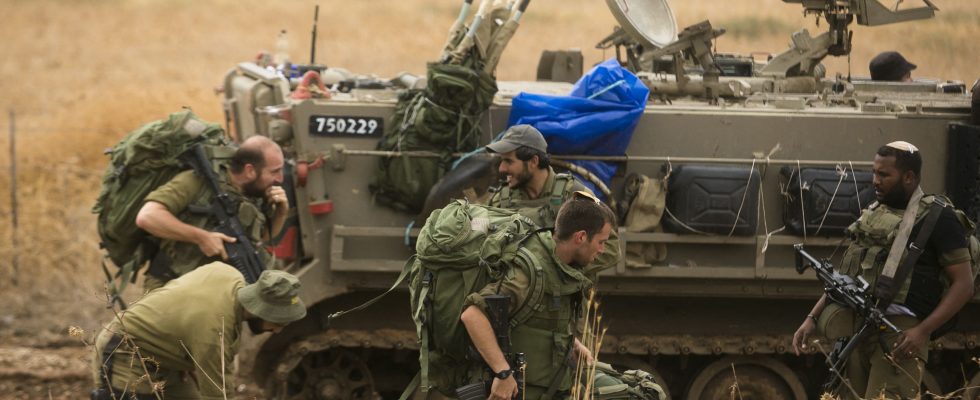All eyes are now turning towards Lebanon. On the border with Israel, deadly clashes are increasing between Lebanese Hezbollah and the Israeli army. Latest tension to date: this Sunday, October 15, an Israeli civilian was killed and several others injured in Shtula, in the north of the country, by a missile attack claimed by Lebanese Hezbollah, an ally of Palestinian Hamas at war against Israel. The IDF responded by targeting Hezbollah positions in southern Lebanon. Israel also closed the border area to civilians within a four-kilometer radius of its territory.
In recent days, exchanges of fire and infiltration attempts from Lebanon to Israel have intensified. Since the start of the war triggered by the unprecedented attack by Hamas in Israel on October 7, the death toll from its clashes has risen to around ten deaths on the Lebanese side, and at least two on the Israeli side. Most of them are fighters from the Lebanese side, but civilians have also been killed, including a Reuters journalist on Friday. At the time of the incident, the Israeli army “suspected Hezbollah fire”, it is written in an article published by Reuters this Sunday.
If the Israeli Minister of Defense, Yoav Gallant, affirmed that his country was “not interested” in a war on the border with Lebanon, these recent events raise fears of the opening of a new front. Sunday’s incident is “one more degree on the scale of escalation. A small degree, but in this kind of situation the small details have enormous importance”, warns the International Crisis specialist on the X network group (ICG) Heiko Wimmen. The party of God has for the moment been content toa statement of support. “We can also estimate that if it had really wanted to create the effect of surprise, Hezbollah would have launched an attack at the same time as Hamas,” estimates the Lebanese daily The Orient-The Day. But could Hezbollah go further? The Party of God “has not been in direct confrontation with the Jewish state since 2006”, recalls the newspaper. At the time, Hezbollah narrowly escaped destruction.
An escalation that no one wants
For now, Hezbollah’s strategy appears to be: keep its actions below a certain threshold so as not to force Israel into more forceful retaliation. But will he go further? Iran will undoubtedly have the last word. “It is unlikely that Tehran would want to waste Hezbollah in a futile large-scale war with Israel for the sole purpose of supporting Hamas in Gaza,” explained the American think tank specializing in international relations, The Atlantic Council, October 10. On the other hand, Israel does not appear to be seeking to open a second front with Lebanon as it focuses on continuing its offensive against Hamas.
So how could an escalation happen? “The risk is that Hezbollah may feel compelled to increase its operational tempo closer to the threshold as the war in Gaza intensifies and destruction and loss of life increases, particularly in the event of a major ground incursion by the Israeli army. The closer Hezbollah gets to the threshold, the greater the risk of miscalculation leading to a war that neither side currently appears to desire,” explains The Atlantic Council.
Since the start of the war between Israel and Gaza, which has already claimed thousands of victims on both sides, voices have been raised to demand that Lebanon, already bruised by several wars with Israel and consumed by a social and major economic crisis, to stay away from conflict. France called on Hezbollah and its Iranian sponsor to “restraint” in order to “avoid opening a new front in the region”. Washington also warned Hezbollah a few days ago not to make a “bad decision”. And UNIFIL, the United Nations force present since 1978 to act as a buffer between Israel and Lebanon, still technically in a state of war, has multiplied alarmist press releases in recent days. She notably warned on Friday of a situation which could become “out of control”.
“No one can guarantee control of the situation”
The Iranian Minister of Foreign Affairs, Hossein Amir-Abdollahian, visiting Beirut at the end of last week, considered that “security and peace in Lebanon” were important, but also warned that “the resistance had its finger on the trigger”. He called on Israel to stop its attacks on Gaza, warning that the war could spread to other parts of the Middle East if the Lebanese Shiite terrorist group Hezbollah joined the battle, causing Israel to suffer ” a huge earthquake. Many analysts believe that Israel’s ground invasion of the northern Gaza Strip, which appears imminent, could be the trigger for Hezbollah intervention. Iran also warned this Sunday that “no one can guarantee control of the situation” if Israel invades Gaza.
During a demonstration in support of the Palestinians on Friday in Beirut, Hezbollah’s number two, Sheikh Naïm Qassem, affirmed that the movement was ready to intervene “at the right time”, to the cries of his supporters calling to strike Israel. “I hope that war will come to Lebanon,” Najwa Ali, a 57-year-old Palestinian born in Beirut, told AFP, one of whose sons, a member of Hezbollah, was killed in Syria. Many Lebanese, who have terrible memories of the last war with Israel in 2006, however fear a new conflict. The war then left 1,200 dead on the Lebanese side, mostly civilians, and 160 on the Israeli side, mostly soldiers.
In a press release dated October 12, the Lebanese government offered a mixed message: without condemning the launching of rockets from South Lebanon, the outgoing cabinet is content to call “all Lebanese protagonists” to ” restraint” and highlights the role of the army in preserving stability and security. Lebanon’s caretaker Prime Minister Najib Mikati said his government’s priority was to maintain calm and stability in southern Lebanon.
